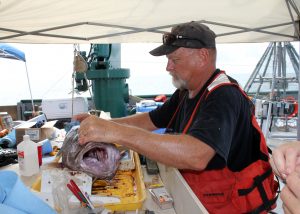The Human Side of Oil Spill Science
– June 7, 2013
(From Summer 2013 Newsletter) Events from the Deepwater Horizon oil spill three years ago remain on the minds and hearts of many people, especially for those who lost loves ones. When an incident of this magnitude strikes, the story is sometimes as much about the response as the event itself and part of the response is from the science community.
In 2011, the Gulf of Mexico Research Initiative (GoMRI) awarded $112.5 million to eight research consortia for studies to help us understand the oil spill, its impacts, and ways to respond better in the future. Experts from many fields of science have come together in an unprecedented manner to provide sound and trusted information. Eight Gulf-based scientists lead these teams from over 80 research institutions in 29 U.S. states and four countries. These directors share their perspectives about this research and their desire to help.
The Researchers on Conducting Independent Science for Better Decisions:
“We are scientists seeking to understand what happened and what is going to happen. We want to be honest brokers of information. We have a high-quality, dedicated team who is looking for the truth.” – Dr. Raymond Highsmith, ECOGIG
“The science community is viewed with much different credibility than are people who are managing this spill from industry and government. We have a unique role to play as the independent arbiter of what happened and what we should be doing, irrespective of the costs, to actually help society.” – Dr. Steven Murawski, C-IMAGE
The Researchers on the Need for Information:
“Most people think that another spill like this will happen again despite all the best efforts of industry. The science coming out of this disaster is a good thing if it helps prevent a similar spill or allows us to mitigate the effects of it.” – Dr. Piers Chapman, GISR
“When the spill happened I received a lot of calls asking, ‘Where is the oil going?’, ‘Will our beaches be ruined? and ‘What will happen to the Gulf in the long-term?’ Our interdisciplinary team of scientists is working hard to address these questions.” – Dr. Eric Chassignet, Deep-C
“People want to know how and why dispersants were applied and what it means when they are used. Once people understand that, then they can evaluate on their own the tradeoffs between what has or hasn’t been done and talk with knowledge to their representatives about their needs and impacts.” – Dr. Vijay John, C-MEDS
“People are concerned about marine life and we are studying how dispersed oil impacts the base of the marine food web and the pros and cons of dispersants used below the surface or in open waters. We want to have a better understanding of the impacts before the next spill occurs.” – Dr. Edward Buskey, DROPPS
The Researchers on the Impact to Society:
“The ecosystem includes humans. The health of ecosystems goes hand in hand with the health of the social structure and the economy, so we’re all on a path together. There are obvious and subtle impacts and we are committed to follow-through on the things we are finding out.” – Dr. Nancy Rabalais, CWC
“From this science, we can learn more about the ocean and have an impact on society. People care about the coast. This work is benefiting society. Fisheries will benefit. Students are getting educated. It’s meaningful research.” – Dr. Tamay Özgökmen, CARTHE
Adapted from a longer article. Original article published here.







